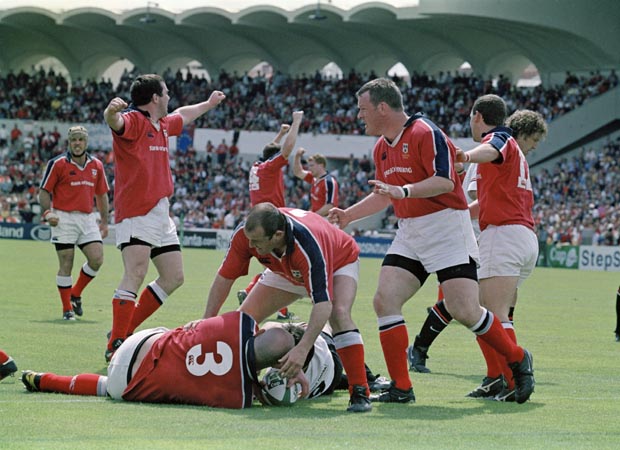
 Munster‘s love affair with the Heineken Cup has become the stuff of legend but in nearly two decades I recall no bigger match or occasion than their first semi-final against mighty Toulouse in May 2000.
Munster‘s love affair with the Heineken Cup has become the stuff of legend but in nearly two decades I recall no bigger match or occasion than their first semi-final against mighty Toulouse in May 2000.
The Stade Chaban Delmas in Bordeaux – I rather fancy it was called Parc Lescure in those days – was where all the Euro madness started. Up to that point Munster had been worthy, but limited, Heineken Cup battlers but thereafter they became Celtic gladiators and many of their battles have been fought on French soil including no fewer than six semi-finals if you include the time Biarritz nipped over the border to San Sebastian.
In the first three seasons of Heineken Rugby, other than their strong showings at fortress Thomond, Munster had failed to set the world alight missing out on the knock-out stages on all three occasions.
Then in the fourth season, despite a 41-21 thumping at Perpignan, there were a few stirrings as Declan Kidney’s team clawed their way into the quarter-finals before losing a scrappy contest away to Colomiers 23-9. Remember Colomiers? Turn left coming out of Toulouse Airport arrivals and you will be there five minutes later top whack. Alas they fell on hard times although they are still battling away in the Pro D2.
In those early seasons Munster struggled mightily in France with five straight defeats including a 60-19 annihilation at Toulouse, the biggest reverse in Munster history and rather like the French themselves Munster were earning a reputation as dodgy travellers.
A new generation, however, was about to add impetus to the old warriors like Mick Galwey, Peter Clohessy and Keith Wood who had been lured back from Quins for the 1999-2000 season. Ronan O’Gara, Peter Stringer, Anthony Foley, David Wallace, Jerry Flannery and others, were beginning to flex their muscles. Thrilling, nail-biting, back-to back wins over Saracens, saw Munster top their pool while they also clambered over an important psychological hurdle in recording their first win in France, a 31-15 triumph back at Colomiers.
A superb 27-10 home victory over Stade Francais in the quarter-finals and it was off to Bordeaux to meet hot favourites Toulouse for the “Duel in the Sun” a game played in furnace-like temperatures which Munster won rather more easily than the 31-25 score line suggests.
“That was the day it all kicked off, that match in Bordeaux is right up there with any in Munster’s rugby history,” insists their captain Mick Galwey. “It was the day we announced ourselves as serious European Cup contenders and it was the day Munster rugby fully embraced professionalism.
“Once we made that leap mentally, then all things were possible. You can’t win all the time but Munster have been a major competitive force in professional rugby ever since Bordeaux 2000. We set a benchmark against Toulouse that day in terms of commitment, stamina and the quality of rugby.
“Until that point we’d been steady in Europe, nothing really special. Strong at Thomond, obviously, but really not great on the road. That season though it was beginning to build and that win at Colomiers was a landmark win which we celebrated like we had won the competition itself.
“I remember nobody really wanted Toulouse away in the semi-finals but there was no panic. A good number of the squad were part of the Ireland team that beat France 27-25 at the Stade de France a few weeks earlier and suddenly French rugby held no fears. The Toulouse team was full of players who lost with France that day. The two front rows for starters were exactly the same. We were still the underdogs but mentally Munster were in a good place, we quietly fancied our chances even if nobody else did.
“We weren’t intimidated but we knew exactly how good Toulouse could be if you let them. Three of us – myself, Anthony Foley and Dominic Crotty still wore the scars from that 60-19 mauling and memories like that certainly sharpens you up in training. Come the day we played like a dream. It was scorching – 30oC officially but it felt even hotter down on the pitch – and although those conditions should have suited Toulouse we played total rugby for 80 minutes and they had no answer.
“We outplayed Toulouse and were much the fitter team which was a source of much pride. It was a command performance that catapulted Munster into new territory. I’d been to France many times with Ireland and Munster teams and it was always the same – 60 minutes of spirited effort and then we always ran out of steam and ideas on the hour. But not this time.”
The other great rugby memory from that campaign was the proudest injury of Keith Wood’s career. Let the great man explain himself: “We were going great guns towards the end of the first half and I got up a real head of steam and did Emile N’tamack on the outside in the build-up to John Hayes’ try. Absolutely scorched the France wing. No really, it’s on the TV footage somewhere. The only trouble was my calf muscle ripped in the process and that was me off for the rest of the match. Talk about a bitter sweet moment.”
Bordeaux 2000 was notable in two other respects. Although a frequent visitor to Thomond it was the first time I had encountered the Red Army on manoeuvres and a unique spectacle they were – Europe’s best, most loyal and thirstiest supporters and by any estimation a factor in Munster being so competitive for so long.
Even when Munster are not playing well – it has been known – their constant unquestioning presence demands 100 per cent commitment every time Munster run out. That support can be the difference in getting a losing bonus point or not which in turn can be the difference in qualifying for the quarter-finals or not.
Bordeaux was also the occasion Richard Harris entered the equation. I had spent the best part of three years seeking an interview with the great man and finally, on the Friday night before the semi-final, as we waited for a taxi into town from our God-forsaken hotel out in some industrial park my mobile lit up. It was Harris, somewhere in the Mexican jungle where he was filming.
He felt no need for introductions or explanations; he launched himself straight into the fray. He required, with the demanding tone of a flustered sports editor a full-update on the Munster walking wounded – notably ‘the Claw’ and Keith Wood who had both been doubtful – while he also required a concise rundown on the Toulouse team along with the latest weather report.
Come the match itself Harris was on every ten minutes for updates – this was costing me a fortune as the thought of texting never crossed his mind – while after the game I resigned myself to financial ruin as first he demanded I pass my phone around the victorious Munster dressing room before he indulged in a full scale post match de-brief with Galwey, the victorious captain.
An hour and 26 minutes to the Mexican jungle – mobile to mobile – and half the bill was mine!
“We had quite a conversation” recalls Galwey with a smile. “I seem to remember French TV was filming it most of the time. The thing was Richard was a massive supporter of Munster but he had a real problem. Every time he had come to Thomond in modern times Munster had somehow managed to lose.
“It had got to the point where a couple of times he wouldn’t come into the ground itself but would sit in his chauffeur-driven car parked up on the Cratloe Road munching sandwiches and listening to the radio. He would only join us in the bar for a jar after the game.
“One time we were six points up with just a couple of minutes left and he nipped in to try and ‘break’ the jinx only to see us concede a late converted try and lose after all. He was absolutely convinced he was a Jonah and went back to his self-imposed ban but after the win over Toulouse he was in a dilemma because he desperately wanted to watch the final.
“He insisted he’d only come to the final at Twickenham if I as captain would give him expressed permission to attend. He was deadly serious, it wasn’t a joking matter. Anyway there I was in Bordeaux having this conversation and of course I was delighted to comply although I had to repeat myself four or five times before he really believed me. And what happened? Richard came to the final and we lost 9-8 to Northampton. We miss him still.”
The classic in Bordeaux was first of four ‘French’ Heineken semi-finals Munster contested in consecutive seasons and in which both the team and their fans cemented their reputation as Euro warriors. Against Stade Francais in Lille in 2001 they lost 16-15 although the game is usually remembered for a second half try by wing John O’Neill that was disallowed in controversial circumstances.
“Let me say first of all that we didn’t play well and didn’t deserve to win so no great injustice was done,” continues Galwey. “It was an interesting one though because we were convinced John had got the touchdown. I immediately ran up to the referee Chris White making the ‘T’ sign with my hands to sort of plead for a TMO referral but Chris just shook his head and said we hadn’t got one!
“So Chris and touch judge Steve Lander had to make the call from what they’d seen in real time and they went: No try. Back home they were showing the slow motion on the TV and it was clearly a try. After that ERC pretty quickly made a ruling that there had to be TMO technology at every knock-out game and I believe that now applies to every game.
“The next year was another Factor 30 day in Beziers when we played Castres. The sun seems to hold no fears for Munster even though we don’t often see it.
“We played very well and I was very proud of the team. Again we outlasted a French team in conditions that were meant to suit them. It was a tight 20,000 stadium and at least half the fans were in the red of Munster, I have no idea how so many get tickets for the big games ever season but thank God they do.
“That was the last time we won a semi-final in France so, hopefully, we’re due a big one next week against Clermont. The following year Munster played pretty well against Toulouse in Toulouse when we lost 13-12. ROG (O’Gara) had a long drop-kick to win it in the final minute but was just wide and like the Stade match you probably couldn’t argue too much with the result.
“There was a bit of gap then before the lads lost 18-7 to Biarritz in San Sebastian when they ran into a very solid pack who took the game away from them but I thought we were really good last year when they played it just right against Clermont. They dug in deep when Clermont got hot and threatened to run away with it and then forced their way into contention at 16-10. Clermont were glad to hear the final whistle.
“I fancy Munster against Toulon next Sunday. The Velodrome in Marseille looks a great venue and Munster could revel there. Toulon are technically the home semi-finalists but it’s not Felix Mayol, it’s not their citadel. I believe the atmosphere will be more that of an international than an intimidating club arena.
“That Munster win over Toulouse the other week was a good as I’ve seen Munster play in recent seasons, a complete tactical performance and I think Munster have another up their sleeve. It’s a big ask – Toulon in the sun down on the Med – but these challenges bring out the best in Munster.”





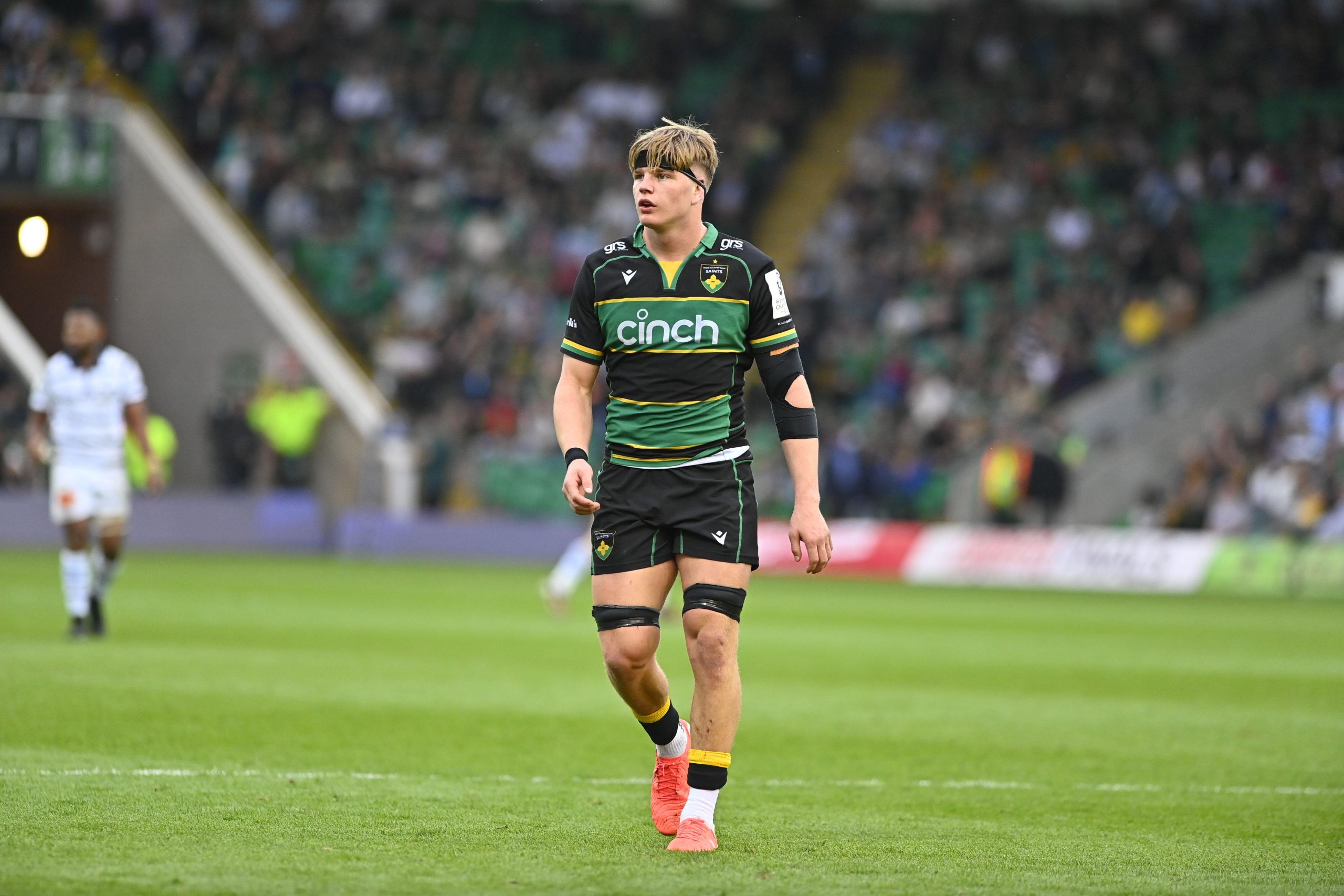















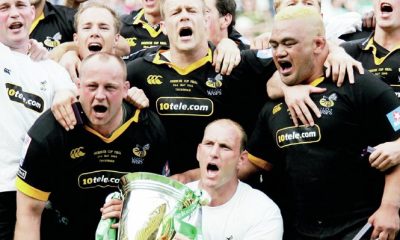



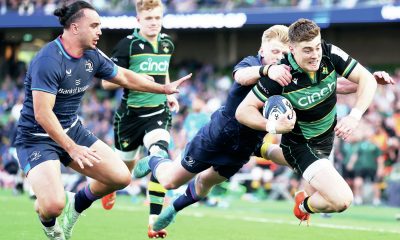

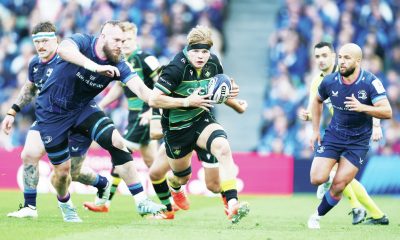

You must be logged in to post a comment Login